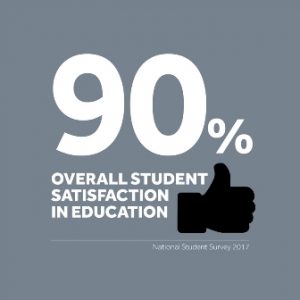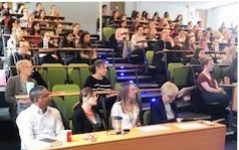
 We hope you will join us for a glass of Prosecco to celebrate the launch of the University of Reading’s new BA in Modern Languages with Qualified Teacher Status at our annual TeachMeet on 18 October 16.00-18.00. This is the third in Modern Languages’ series of teacher-aimed events and previous meetings have been ideal opportunities for sharing ideas and good teaching practice, as well as networking and socialising. Colleagues from the Institute of Education (IoE) and Department of Modern Languages will be on hand to chat, along with some of our current students. In our last session we considered topics suggested by teachers including: promoting diversity in the classroom, using digital media to teach, encouraging students to go beyond the curriculum and preparing for the new A-level curriculum.
We hope you will join us for a glass of Prosecco to celebrate the launch of the University of Reading’s new BA in Modern Languages with Qualified Teacher Status at our annual TeachMeet on 18 October 16.00-18.00. This is the third in Modern Languages’ series of teacher-aimed events and previous meetings have been ideal opportunities for sharing ideas and good teaching practice, as well as networking and socialising. Colleagues from the Institute of Education (IoE) and Department of Modern Languages will be on hand to chat, along with some of our current students. In our last session we considered topics suggested by teachers including: promoting diversity in the classroom, using digital media to teach, encouraging students to go beyond the curriculum and preparing for the new A-level curriculum.
The new BA will see students reaping the benefit of expertise from both the Department of Modern Languages and European Studies and the IoE. It will equip them with high-level language skills and a sound knowledge of the cultures in which their language or languages of study are spoken. They will be trained by sector-leading educators at the IoE to develop classroom-based teaching skills that are strongly underpinned by the most recent and relevant research. Currently a £9,000 bursary is available to students during the fourth year of the Modern Languages with QTS course. Language teachers are in high demand in today’s schools and a Modern Languages degree with QTS offers job satisfaction along with competitive salaries.
If you would like to attend our event and/or would like to suggest a topic for discussion, please email Katy Green on k.e.s.green@reading.ac.uk.
For more information on the new BA please see our webpage.





 The main speaker at the conference is
The main speaker at the conference is  The influence of education is not confined to the humans at London Road, as our trees have finally found their voice and are set to share their views during a special Treelaxation session today, 8 June, outside Building 33 between 1.15-2 pm .
The influence of education is not confined to the humans at London Road, as our trees have finally found their voice and are set to share their views during a special Treelaxation session today, 8 June, outside Building 33 between 1.15-2 pm . 






 The IoE was proud to present a fantastic ATP (BA Primary Education (QTS) Advanced Teaching Project) conference at our beautiful, sun-filled London Road campus on 7 May.
The IoE was proud to present a fantastic ATP (BA Primary Education (QTS) Advanced Teaching Project) conference at our beautiful, sun-filled London Road campus on 7 May. We benefited from our excellent key note speaker to the conference: Dr Carol Fuller, the distinguished educational researcher and Associate Professor in Education.
We benefited from our excellent key note speaker to the conference: Dr Carol Fuller, the distinguished educational researcher and Associate Professor in Education.